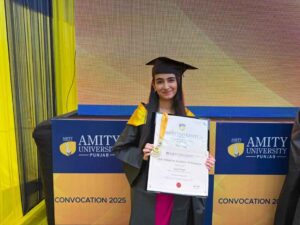Timely diagnosis of Congenital Heart Defect can save your child’s life
3 min read
Mohali, September 27, 2023: Congenital Heart Defect (CHD) is the most common cause of infant death in India, it is estimated that more than 1,80,000 children are born with CHD every year. Many infants with CHDs require surgical intervention within the first year of life, else the condition can prove to be life threatening. Timely intervention is hence important in such cases.
The prime concern for parents is to know if their newborn baby is healthy. However, the blissful experience soon turns into a heartbreaking moment if the child is born with a Congenital Heart Defect (CHD). Scores of parents undergo extreme mental anguish to witness their child undergo a surgery.
The Department of Paediatric Cardiac Sciences at Fortis Mohali has made remarkable achievements and is the only hospital in the region to receive patients not only from Punjab, Haryana and Himachal Pradesh, but also from Pakistan, Afghanistan, Iraq, Mongolia and South Africa.
Dr Rajat Gupta, Senior Pediatric Cardiologist, Fortis Hospital, Mohali, gives us a detailed insight into the current scenario of congenital heart defects.
What Kind of Heart Problems Do Children Face: Are They Different from Those of Adults?
Most of the heart problems in children are present by birth (Congenital heart defects or CHD) and it can be a simple hole in heart, multiple holes in different parts of heart, tightness of a heart valve or artery or it can be a very complex defect where arteries are connected in a wrong manner or half of the heart is not formed well. Some heart problems in kids are the result of bacterial infections (Rheumatic heart disease) or the viral infections (Myocarditis).
What causes congenital heart disease (CHD)?
Congenital Heart Disease is caused by an abnormal formation of the heart during growth in the womb. Though the exact reason for the health condition is not known in most of the instances, some of the causes include:
- Genetic: Problems with genes or chromosomes in the child such as Down Syndrome.
- Viral infection: A viral infection like rubella and other conditions in a pregnant woman.
- Maternal Diabetes: Diabetes may also affect the growth of a baby’s heart.
Symptoms to watch out for?
A child may appear healthy, but can still have an underlying cardiac problem. This is because congenital heart defects may or may not always exhibit symptoms in a baby. Also, symptoms vary as per age. Babies may experience trouble in breathing, poor weight gain, feed intolerance, bluish discoloration around the lips known as cyanosis. Older children and adolescents experience symptoms such as palpitation, syncope (or blackout), poor weight gain, reduced exercise tolerance and easy fatigability.
Diagnosing the Condition:
Though most of the CHDs can be diagnosed during pregnancy using a special type of ultrasound called a fetal echocardiogram, however many of them are detected only after birth or later in life, during childhood or adulthood. If a doctor suspects a baby could have a congenital heart defect, echocardiography is the first step to confirm the diagnosis.
Treatment Options:
Treatment of congenital heart defects depends upon the type and severity of the condition. Some of these holes and valve obstructions can be treated without surgery using a procedure called cardiac catheterization, while others need one or more open heart surgeries. Sometimes, the heart is so malformed that it cannot be fully repaired even with multiple surgeries. In such a scenario, a series of surgical procedures can improve the blood flow, thereby improving the symptoms and prolonging life.
When to Operate:
Timing of surgery or intervention in congenital heart defects depends upon the type of defect, its size and severity. Some conditions need to be operated immediately after birth, some within the first month of life and others at four to five months of age. There are some defects which can even be operated at one to five years of age. It is important to follow the instructions of pediatric cardiologists because delay in treatment will adversely affect the results of surgery.
Kids can lead a normal life:
A majority of children with repaired congenital heart defects are fully active and don’t need restrictions. Physical activity should be promoted. Swimming, cycling and running should be encouraged. In a few children with specific heart problems, the pediatric cardiologist may advise against strenuous playing activities or competitive sports.




